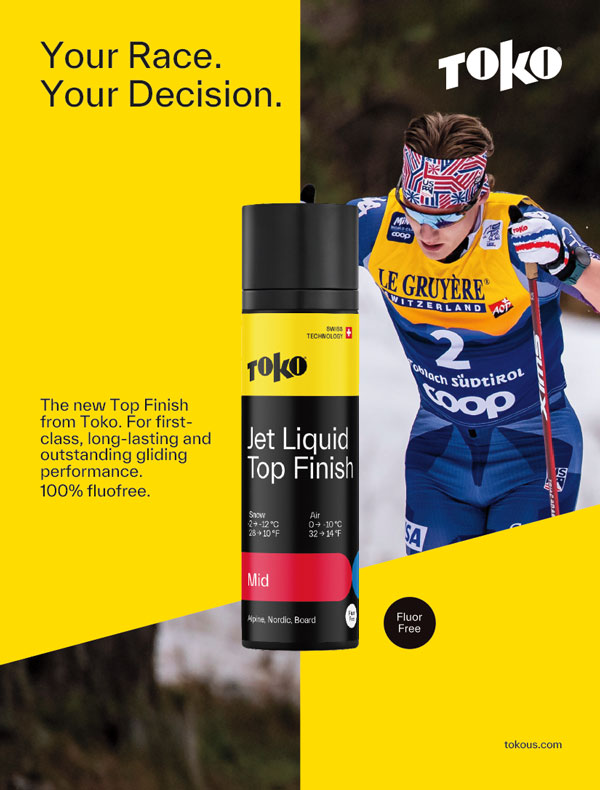
The Run-Down on Rybinsk
Kris Freeman
Wed, Dec 19, 2007 - By Zach Caldwell
First things first - many congratulations to Kikkan on her victory today. Kris said it was an impressive race, and that she was clearly the strongest skier out there today. Good stuff!
Kris and I finally managed to catch up on the phone when he (and the rest of the World Cup) got to Munich this evening. He was not a happy man. The disappointment of Beitostolen was easy enough to swallow when it was followed up with a good result in Kuusamo. And the (double) disappointment of Davos yielded to anticipation for another chance in Rybinsk. But, especially after the circumstances in Davos, any explanation of failure in Rybisnk was bound to sound like an excuse. And that’s how Kris lead off his explanation of the circumstances: “I hate using this as an excuse, but you ought to know…”
In the previous post I alluded to some “suspicions” about what might have gone wrong, and the primary suspicion in my mind was blood sugar management difficulties. Blood sugar management is always on the check list of things that “might have gone wrong” when Kris has an unexpectedly bad result. But I had specific reasons for my suspicion this time around. Ever since the week prior to the Beitostolen opener Kris has been on a very low training load. After Beitostolen, when it was apparent that he really had a virus, he took several days off completely. In the lead-up to Kuusamo he took it quite easy, and had maybe four hours of training in the days prior to the race. Then they headed down to Davos, and the load remained quite low. In hindsight, this might have been the time to crank up the training load a little bit, but at the time he was just over being sick, had done a tough race in very cold conditions, followed by a travel day, and we thought it best to keep things easy. The Davos races were quite taxing - in fact, they pretty well wrecked him. We had originally looked at a day or two of good training opportunity in Davos after the races, but under the circumstances he was took tired to make much use of training. By the time Kris got to Rybinsk, between illness, race sharpening, races and travel, Kris had about three weeks of extremely low volume under his belt.
When the training load goes way down Kris’s insulin sensitivity decreases, meaning he needs more insulin to manage his blood sugar. Immediately prior to travel to Russia Kris told me that his insulin sensitivity was as low as he’d ever seen it. That’s why my thoughts went straight to blood sugar when I began speculating about the reasons for a bad race.
When Kris is training at a very high volume load his insulin sensitivity is so high that he’s basically barely diabetic. At times his basal dose goes as low as one, or even half a unit of Lantus (long-acting 24 hour insulin). When he shifts gears and starts training more intensity and less volume his insulin sensitivity starts to decrease. His best performances have come when his basal dose is somewhere in the range of 5 to 7 units. It seems to be important for Kris to be able to boost his dose on race day (actually, the night before) in order to compensate for the adrenaline of a race day, and to optimally mobilize blood sugar for absorption by his muscles during a race. On race day in Kuusamo he was on a basal dose of 12 (or maybe 13) units. It was as high a basal dose as he’d ever used.
In Rybinsk Kris’s basal dose requirement was very high - the highest he’s seen. The night before the race in Russia Kris had 22 units of basal insulin in his blood, and it wasn’t even doing the trick. Even with this unprecedented dose his blood sugar climbed 100 points over the course of an hour, lying in bed, on Friday night before the race. In the end he had to get up and do 150 jumping jacks at 11PM in order to stimulate a bit of insulin sensitivity. So much for boosting his race-day dose above his current maintenance dose - he could barely keep up with his basic blood sugar control requirements. And since he was in unprecedented territory (as far as dosage is concerned), he was not confident that he could go much higher in dosage.
It’s still not totally clear how Kris’s blood sugar affected his race effort. The race started well. He felt fine in the early going. He has planned to ski further toward the front of the pack in mass start events this year. He made it clear that he was not out looking for the lead, but he found himself there a couple of times. And when he was in front he was skiing smoothly and easily. It wasn’t until he took a feed than things started to turn sour. In fact, he took two feeds in pretty quick succession, and he gradually found himself drifting to the back of the pack. As easy as it was to ski in the lead in the early going, he was having trouble hanging on as the race developed. And eventually he just lost contact and drifted back. There was no one moment when he blew-up, but over the course of the race his capacity ebbed. At the finish his blood sugar was low - not of the charts low, but certainly sub-optimal. It’s somewhat paradoxical that he should start to suffer after taking a feed. Kris wondered aloud how things might have unfolded if he hadn’t taken a feed, but it’s so unclear what was actually going on that it does no good to speculate. The fact is, nobody really knows what to expect when the standard insulin and blood sugar parameters get stretched for Kris. There’s only one other guy on the World Cup with diabetes - Robin Bryntesson - a sprinter from Sweden. Incidentally, he was taken away by medics after finishing tenth today.
By his own admission, Kris is a control freak. He can’t tolerate a loss of control, and the thing that makes him most angry (and he is angry) about this past weekend is the loss of control. Kris envisions himself an overall World Cup winner - that, for him, is the pinnacle of success in the sport. Circumstances like this make him doubt whether he’s even got the potential to be consistent enough to contest the entire world cup season. This doubt cuts to the core of his identity, and it gnaws at him. Kris knows that he’s got to get past this and move on, but his confidence has taken a major hit. In Davos it was easy to blame circumstances. Here, his failure reflects only on himself. Kris hates failure.
It’s unclear, under the circumstances, how much differently Kris could have managed things this period. While the 5th place in Kuusamo has to be considered a success, Kris is not coming home with a good taste in his mouth. As he summed-up the four-week period, he raced sick in Beitostolen, raced well in Kuusamo, raced well (but had bad skis) in Davos, and tanked in Rybinsk. Given the instability that Kris experienced in Russia, it seems clear that some additional training load was required someplace in there. As I mentioned, the right place was probably in Davos, in the days before the races. But obviously I wasn’t calling for a heavier training load at the time.
When Pete and Kris and I met in April, our goal was to send Kris to the first period ready to fight for top-ten positions. After Beitostolen we were prepared to swallow a lesser start than we’d hoped for. After Kuusamo we were hungry for more success. After Davos we felt robbed. Now the first period is over and we can look back on the whole picture. It’s indisputable that Kris’s preparation was sufficient to put him in contention for top-ten finishes. It’s disappointing that he only had a 25% delivery on “representative” efforts. It’s hard to pull a whole lot more information out of the complex chain of events that has unfolded, even in hindsight. Kris feels quite clear that he can’t allow the training load to stay so low for so long, and if there is one major lesson from this period, that is it. Now I’ll need to talk to Pete, and catch up with Kris again when he gets home. There may be some minor adjustments to the plan in the lead-up to Nationals. We’ll let that drift into place when we’ve all had a chance to reflect on things.
Incidentally, Kris started the sprint today. He took the race seriously, warmed up well and utterly failed to distinguish himself. In reality, he finished about a second behind Lars, under four behind Koos, and almost eight behind Newell. At home, this would have been unremarkable. On the World Cup it put him in 66th place. He found time to die out there. He felt that he skied the first part - flat and downhill - quite well. Then he died where Kikkan made herself a world cup winner - on the climb. This is an unremarkable footnote. He wasn’t even going to do the sprint unless he was so hot he just had to do it, or he was pissed off and had something to prove. No need to guess which scenario was playing out. In the end he proved that he was tired from the day before.
It would be really nice to have had the Kuusamo result as the last thing before coming home. You can bet that Kikkan will be quite confident for the next five weeks as she prepares for Canmore. Kris will have to build that confidence the hard way. But he does have the knowledge that Kuusamo was an accurate reflection of his preparation. He can be there again, and he can be better.
Reprinted with permission from the Kris Freeman website at http://www.krisfreeman.net/. Copyright © Zach Caldwell and Kris Freeman

